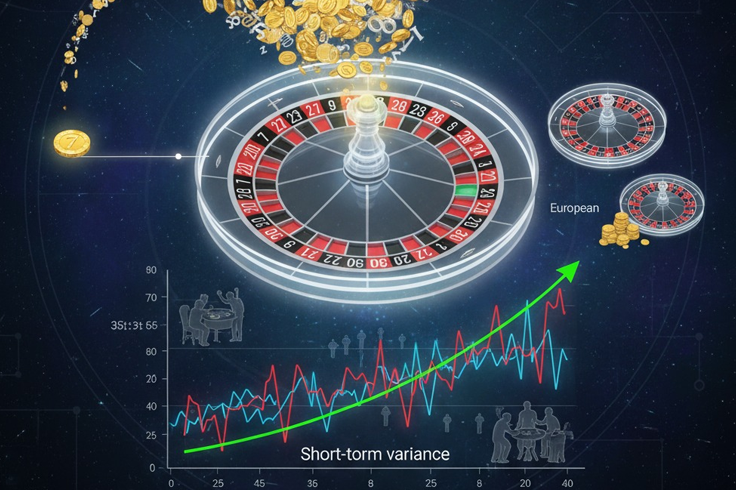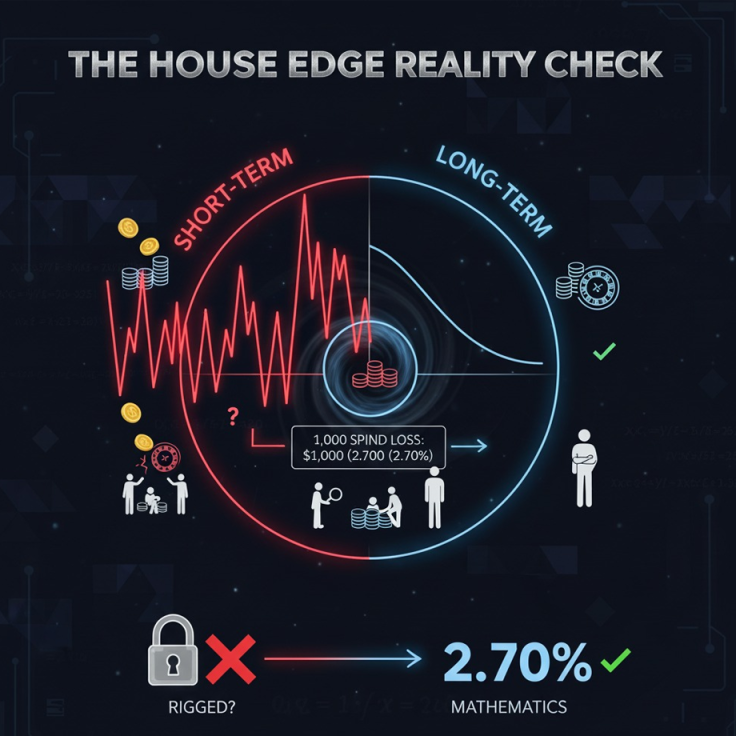Can You Actually Win at Online Roulette – Or Is It All Rigged? (Expert Advice Inside)
Shocking Roulette Revelations: Why Players Always Think The Wheel Is Fixed

At some point, every online roulette player asks the same question: is this game fair, or is it rigged?
You hit a losing streak, the ball never seems to land where you want, and suspicion creeps in. With millions wagered daily – and the house always winning in the long run – it feels logical to wonder if casinos are quietly stacking the odds against you.
To separate fact from frustration, I spoke with Otto Bergstrom, senior roulette analyst at Roulette UK, who has spent over a decade studying online casino mechanics. His verdict?
'Rigging games would actually be bad business for licensed casinos. They already have a built-in mathematical edge—why risk their reputation and license for marginal gains?'
The reality isn't a simple yes or no. Roulette's fairness is rooted in mathematics, regulation, and psychology. Let's break it down.
Why The Maths Already Favour The House

Roulette doesn't need manipulation—the odds are already against you..
- European roulette: House edge = 2.70%
- American roulette: House edge = 5.26%
This edge is 'baked in' through payouts. A single-number bet pays 35:1, but the true odds are 36:1 (37 slots on the wheel). That small discrepancy guarantees long-term profit for casinos.
Over time, the math is relentless. On £1 million ($1.3 million) wagered:
- European wheels return about £27,000 ($36,000) profit to the casino.
- American wheels return about £52,600 ($71,000).
Players often misinterpret normal variance as rigging. Hot streaks, cold streaks, and strange clusters of results happen by chance.
'I've seen players hit the same dozen eight times in 20 spins, and others watch it vanish for 80 spins,' says Bergstrom. 'Both are perfectly normal statistically.'
The Technology Behind Online Roulette
Online roulette comes in two formats:
- RNG (Random Number Generator) – Outcomes are produced by certified algorithms. Independent labs like eCOGRA, iTech Labs, and GLI test them to ensure statistical randomness and fair RTP (Return to Player).
- Live dealer – A human spins a physical roulette wheel on camera. Multiple angles confirm transparency, and physics—not software—determine results.
Both are legitimate when licensed. Some players prefer live games for visibility, others trust RNG certification. The key is that both undergo strict oversight.
Why It Sometimes Feels Rigged
Humans struggle with randomness. We see patterns where none exist.
Example: Betting red, but black lands seven times in a row. This occurs roughly 0.78% of the time—rare, but far from impossible.
Cognitive biases add to the frustration:
- Loss aversion makes losing streaks feel heavier than equivalent wins.
- Near-miss bias exaggerates frustration when the ball lands close to your number.
Bergstrom has reviewed thousands of player complaints:
'Almost every time, the data shows results within normal statistical ranges. What feels impossible is usually just variance.'
The Power of Licensing and Regulation
The strongest safeguard is regulation. Licensed casinos in the UK, Malta, Gibraltar, and other jurisdictions must prove their games are fair through independent testing and audits.
Cheating would destroy their business. Penalties include:
- Licence revocation
- Heavy fines
- Criminal charges
For companies processing millions in revenue, the risk isn't worth it.
The real danger lies with unlicensed or offshore operators, where fairness concerns are genuine.
Red Flags That Should Alarm You

Watch for these warning signs when choosing an online casino:
- No valid license or unclear regulatory oversight
- Unrealistic promotions that look too good to be true
- Payment issues such as delayed withdrawals or repeated verification hurdles
- No transparency about RNG certificates or audits
- Poor or unknown software providers with glitchy, unreliable games
Stick to reputable, licensed operators to minimise risk.
The House Edge Reality Check

Even in fair games, roulette math works against players long term.
Example: £10 ($13) bets over 1,000 spins = £10,000 ($13,000) wagered.
Expected loss: £270 ($364) on European wheels.
Variance means you may win big some sessions, lose heavily in others—but over thousands of spins, results gravitate toward that house edge.
'The house edge isn't hidden,' says Bergstrom. 'It's disclosed. Players confuse mathematical certainty with unfairness.'
Testing the Waters Safely
Sceptical? You can experiment without risk.
- Try free-play games – Same RNG as real-money, no financial exposure.
- Start small – Use minimal stakes when playing for real money.
- Track results – Keep logs over hundreds of spins.
- Review game histories – Licensed casinos let you audit your play.
Sites like rouletteuk.co.ukprovide demo options to test fairness before committing.
Can Professional Players Really Win?
Consistently beating roulette is nearly impossible.
'True professional roulette players are rare,' Bergstrom notes. 'Some once exploited wheel bias in physical casinos, but modern wheels are maintained too well for that.'
Most so-called 'professional' roulette players today earn money as affiliates, system sellers, or educators—not from playing long-term.
Live Dealer vs. RNG: Which Is Fairer?
Both formats can be fair:
- Live dealer removes algorithmic doubt but introduces variables like dealer behaviour and wheel conditions.
- RNG eliminates human factors but relies on certified randomness.
The choice is personal preference – statistically, both are equally legitimate under proper regulation.
The Variance Trap Explained
Variance is often mistaken for unfairness. Roulette is a high-variance game, meaning short sessions can produce results wildly outside expectation.
Only thousands of spins reveal the true house edge.
Analogy: Flip a coin ten times and get seven heads—it doesn't mean the coin is rigged. Short samples mislead.
Advanced Detection Methods
For the statistically inclined, tools exist:
- Chi-square tests – Compare actual outcomes vs. expected randomness.
- Runs tests – Measure streak lengths.
- Correlation tests – Ensure outcomes are independent.
But these require large datasets and expertise. Most casual players misinterpret the data, so professional audits are more reliable.
The Economics of Fair Play
Casinos already win without cheating. Licensed operators invest millions in compliance, audits, and brand reputation. Rigging would risk catastrophic fines and brand collapse.
'Legitimate casinos profit from trust,' says Bergstrom. 'Breaking that trust would be business suicide.'
Player Protection Measures
Most regulated markets enforce safeguards:
- Game histories for player review
- Dispute resolution mechanisms
- Independent audits for ongoing compliance
Some regulators even log all game outcomes for investigations, making systematic cheating virtually impossible in licensed casinos.
The Bottom Line: Can You Beat The Wheel?
- Short term – Yes, variance produces wins.
- Long term – No, the house edge prevails.
- Rigged? – At licensed casinos, no. The games are fair within mathematical limits.
The safest approach:
- Play at licensed operators
- Accept roulette as entertainment, not investment
- Enjoy the experience, but never rely on it for profit
'If you play for fun and within your means, roulette can be genuinely enjoyable,' Bergstrom concludes. 'If you're trying to win consistently, you're fighting mathematics itself.'
Final Word
Roulette isn't rigged at legitimate casinos. The house edge is in plain sight, enforced by maths and regulation. What feels unfair is usually variance and human bias.
The wheel spins, the ball bounces, and the house edge grinds on—fairly, predictably, and unavoidably.
© Copyright IBTimes 2025. All rights reserved.





















